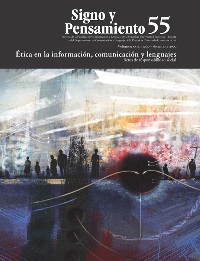Abstract
The Clause of Conscience is internationally recognized as a key ethical principle in the practice of journalism. The main goal of this paper is to assert that the clause of conscience proposes a significant limit to the powers of employers, since it allows journalists to overcome conflicts of conscience in the least traumatic way possible by making use of what is known as conscientious objection in other liberal professions. This is done through a comparative analysis of aspects like validity, meaning and new trends in the wording, content, and practice of this prerogative in present-day journalism ethics codes at a transnational level, as well as in Europe and Latin America.
Barroso Asenjo, P. (1991), “Códigos deontológicos de la comunicación”, en Diccionario de ciencias y técnicas de la comunicación, Madrid, Paulinas.
Blázquez, N. (2000), La nueva ética en los medios de comunicación, Madrid, bac. Díaz Arias, R. (2003), “La cláusula de conciencia”, en Bel Mallén I. y Corredoira y Alfonso, L. (coords). Derecho de la información, Barcelona, Ariel.
Galán Gamero, J. (2002), “El ejercicio de la ética profesional respecto a la empresa”, en Agejas J. A., Serrano Oceja F. J. (coords.), Ética de la comunicación y de la información, Barcelona, Ariel.
Laitila, T. (1995, diciembre). “Journalist Codes of Ethics in Europe”, en European Journal of Communication, vol. 10, núm. 4.
López Talavera, M. M. (2003), Fundamentos éticos de la prensa en América Latina [tesis doctoral], [cd-rom], Universidad Complutense, Doctorado en Ciencias de la Información.
Navarro Marchante V. J. y Rodríguez Borges, R. F. (2002, abril), “La cláusula de conciencia de los profesionales de la información. La Ley Orgánica 2/1997” en Revista Latina de Comunicación Social, núm. 49.
Ramos, F. (2000), Manual de derecho de la información y la publicidad, Santiago de Compostela, La Verde.
Segalés, J. (2000). La cláusula de conciencia del profesional de la información como sujeto a una relación laboral, Valencia, Tirant lo Blanch.
Zambrano Ortiz, L. F. (2009, 23 de marzo), “La conciencia del periodista” en Diario Hoy [en línea], disponible en: http://www.hoy.com. pe/columnistas/modNoticias, consultado: mayo de 2009.
Zeta de Pozo, R. (2002), Hacia la cláusula de conciencia en el Perú, Piura, Universidad de Piura.
— (2005, febrero), “Hacia un defensor de la audiencia en los medios peruanos”, en Sala de Prensa [en línea], vol. 3, núm. 76, disponible en http://www.saladeprensa.org/art592.htm, consultado, mayo de 2009.
This journal is registered under a Creative Commons Attribution 4.0 International Public License. Thus, this work may be reproduced, distributed, and publicly shared in digital format, as long as the names of the authors and Pontificia Universidad Javeriana are acknowledged. Others are allowed to quote, adapt, transform, auto-archive, republish, and create based on this material, for any purpose (even commercial ones), provided the authorship is duly acknowledged, a link to the original work is provided, and it is specified if changes have been made. Pontificia Universidad Javeriana does not hold the rights of published works and the authors are solely responsible for the contents of their works; they keep the moral, intellectual, privacy, and publicity rights.
Approving the intervention of the work (review, copy-editing, translation, layout) and the following outreach, are granted through an use license and not through an assignment of rights. This means the journal and Pontificia Universidad Javeriana cannot be held responsible for any ethical malpractice by the authors. As a consequence of the protection granted by the use license, the journal is not required to publish recantations or modify information already published, unless the errata stems from the editorial management process. Publishing contents in this journal does not generate royalties for contributors.


